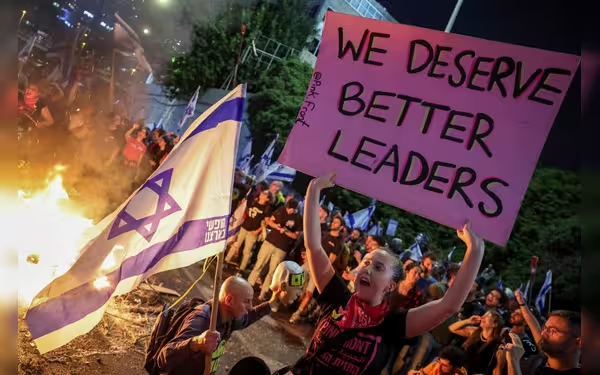Saturday, November 16, 2024 05:33 PM
Israeli Defense Minister Yoav Gallant Resigns Amid Political Turmoil
- Yoav Gallant steps down as Israeli Defense Minister.
- Israel Katz appointed, signaling hardline policy continuation.
- Humanitarian aid efforts face significant challenges in Gaza.
 Image Credits: arabnewspk
Image Credits: arabnewspkIsraeli Defense Minister Yoav Gallant resigns, raising concerns over Gaza aid and political stability amid ongoing conflict.
In a significant political shift, Israeli Defense Minister Yoav Gallant officially stepped down on Friday, following his dismissal by Prime Minister Benjamin Netanyahu earlier in the week. This change in leadership has sparked widespread protests across Israel, as many citizens viewed Gallant as a crucial moderate voice within a government perceived as increasingly far-right. His removal raises concerns about the government's commitment to addressing the ongoing hostage situation in Gaza, where many individuals remain unaccounted for.
Gallant's replacement, Israel Katz, is a seasoned politician and a loyal ally of Netanyahu, having previously served as the foreign minister. His appointment signals a continuation of Netanyahu's hardline policies, which have drawn criticism both domestically and internationally. The political landscape in Israel is becoming more polarized, with many citizens feeling that their voices are being overshadowed by the far-right agenda.
On the humanitarian front, the Israeli military body responsible for coordinating aid to Gaza, known as COGAT, announced plans to open a new aid crossing into the territory. However, details regarding the timeline for this crossing and the distribution of aid remain unclear. The urgency for increased humanitarian assistance is palpable, as the United Nations reports that Israel's month-long military offensive in northern Gaza has severely hindered the delivery of essential supplies to an estimated 75,000 to 95,000 Palestinians.
In a related development, the Israeli military has agreed to allow 300 truckloads of humanitarian aid from the United Arab Emirates to enter Gaza in the coming days. This figure falls short of the 350 trucks per day that the United States has advocated for, highlighting the ongoing challenges in meeting the urgent needs of the population affected by the conflict.
The Israel-Hamas war, which erupted on October 7, 2023, has resulted in devastating casualties. Reports indicate that approximately 1,200 people, primarily civilians, were killed during the initial attacks, with 250 others taken hostage. In response, Israel's military operations in Gaza have reportedly claimed the lives of over 43,000 individuals, according to Palestinian health officials. The toll of this conflict is staggering, with more than half of those killed being women and children.
Additionally, the conflict has spilled over into Lebanon, where Hezbollah began firing into Israel on October 8, 2023, in solidarity with Hamas. The health ministry in Lebanon has reported over 3,100 deaths and approximately 13,800 injuries since the outbreak of hostilities.
As the situation continues to evolve, the international community watches closely, hoping for a resolution that prioritizes humanitarian needs and fosters dialogue. The ongoing violence and political upheaval underscore the urgent need for a comprehensive approach to peace that addresses the root causes of the conflict. The path forward remains fraught with challenges, but the voices of those affected must not be overlooked in the quest for a lasting solution.













